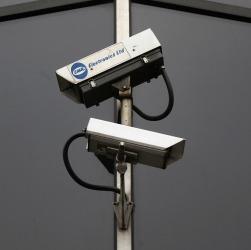BOB GARFIELD: Surveillance camera images of Tamerlan and Dzhokhar Tsarnaev catalyzed not only the manhunt, which caught them, but calls for more surveillance cameras around the country. The usual suspects took their usual sides on the issue, law enforcement speaking security versus privacy advocates speaking privacy. But it's worth remembering that right now video surveillance is a blunt tool. Technology is racing forward toward capabilities that will make today’s surveillance methods and the privacy fears attached to them seem almost quaint. Christoph Bregler is a professor of computer science at New York University. His lab has received military and commercial funding to create the surveillance tools of the future. Chris, welcome to the show.
CHRISTOPH BREGLER: Thank you for having me.
BOB GARFIELD: I guess the main thing separating whatever tomorrow's technology is from today's is searchability.
CHRISTOPH BREGLER: That’s correct. Right now you can search any text with Google and find it right away. But you cannot do the same thing on video yet. So we’re working on making that searchable in a similar way.
BOB GARFIELD: I'm trying to imagine a zillion cameras deployed and the cops or the CIA or the Army being able to figure out exactly where I've been, who I’ve been with and what I was doin’, you know, with a mouse click.
CHRISTOPH BREGLER: Yes, so that was actually the initial goal already over 10 years ago, and we've been working on using face recognition but also intrinsic biometrics. In simple terms, it’s when you look 20 blocks down the street, even you cannot recognize a face, if this is your friend, you can recognize, oh, this is exactly the motion pattern of “Uncle Freddy.”
BOB GARFIELD: You mean his gait, his pattern of walking –
CHRISTOPH BREGLER: Right.
BOB GARFIELD: - his posture.
CHRISTOPH BREGLER: His timing, his gestures, his body language. I myself, I’m from Germany and when I'm in New York and I see a German tourist 20 blocks away, I can tell this is exactly an Italian tourist or a German tourist, even without –
BOB GARFIELD: Wait, wait, wait, you have German-dar?
CHRISTOPH BREGLER: Yes, yes, I have, and we actually showed that computers can do that too. We can detect national background. Our technique can do this with 80% accuracy, if we combine that with sound spectrum of how the people are speaking, the height of the person. We are getting to very, very small, error rates.
BOB GARFIELD: Chris, I want to ask you about the Boston Marathon bombings. Police eventually located suspects by combing through a lot of surveillance camera footage, actually, not government surveillance cameras but private ones, I think, attached to a Lord & Taylor store, where they finally made their positive ID. How would that investigation change in the future that you’re envisioning?
CHRISTOPH BREGLER: If you look at any kind of attack, there’s always enough information there. It's just the problem - people couldn't connect it fast enough. What we are working on is to narrow down, out of millions of videos, down to like the top 100 events, and then a security specialist can go in there and then decide, yes, this is suspicious or this is not suspicious. So, for example, we know that two hours before the event there was an entire bus of tourists coming out and positioned themselves at a certain corner, and we can track them and can rule out this set of people is less suspicious. And then whoever is left over is marked red. The most important thing is we can do this instantly.
BOB GARFIELD: Well, it’s easy to see why law enforcement would be champing at the bit to get ahold of these tools. And it's also easy to see why privacy advocates are, are frantic, because you're, you’re describing the security state. You’re describing “Big Brother.” The abuse of this kind of technology seems to be almost unavoidable. How worried should we be?
CHRISTOPH BREGLER: Definitely, we should be worried because the police has access to a lot of surveillance of video cameras. And right now the technology is not there yet to allow them to actually process all the video. All the agencies are right now overwhelmed with too much data they cannot process, and I would even speculate right now that through crowdsourcing and the Internet, all the citizens altogether are faster than government agencies right now in processing it. We’re all “little brothers” to the “Big Brother” and we are actually – have much more power than we expected.
BOB GARFIELD: Nonetheless, we are envisioning a government who could, if they wished to, and could get away with it, routinely follow us around, which just seems so grossly not the American way. What do you anticipate will happen once this technology is unleashed?
CHRISTOPH BREGLER: We just have to get used to it, that we’re less private citizens. We will most likely act differently in public places because we know in advance if I'm out in the public sitting in a café, I know whatever I do somebody will track it. And so, we might change our behavior.
BOB GARFIELD: Because the government is – watching and –
CHRISTOPH BREGLER: The government and everybody else.
BOB GARFIELD: Chris, thank you so much.
CHRISTOPH BREGLER: You're welcome.
BOB GARFIELD: Christoph Bregler is a professor of computer science at New York University.

